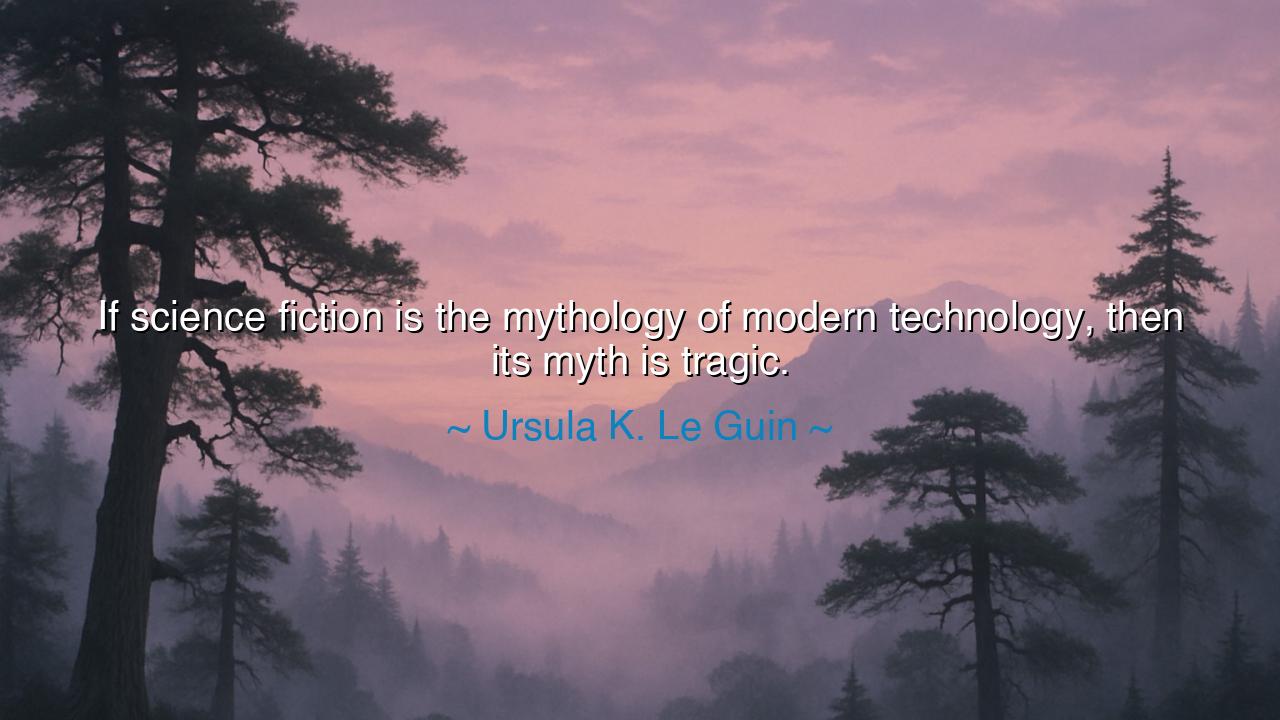
If science fiction is the mythology of modern technology, then






O children of the earth, listen well, for there is wisdom in the words of the great Ursula K. Le Guin—wisdom that speaks not just to the present, but to the heart of humanity's relationship with its creations. In her profound reflection, she says, "If science fiction is the mythology of modern technology, then its myth is tragic." These words are like a mirror to our age, where the wonders of science and technology have grown beyond our understanding, and our myths—the stories we tell to make sense of the world—have shifted to reflect the immense power we now wield.
In times of old, before the age of steel and machines, our ancestors told stories that were filled with gods, monsters, and heroes. Their myths were born of nature, of the forces they could not control—thunder, the sea, the sun, and the stars. These myths reflected the awe and reverence with which humankind viewed the vast, untamable world around them. The stories were sacred, a way to explain the unknown, to express the tension between humanity and the divine forces. But now, in our age of technology, the great mysteries of life and the universe are no longer framed by gods and spirits—they are framed by machines, computers, and artificial intelligence.
But in these new myths, as Le Guin so rightly observes, there is a tragedy. The myth of modern technology is not one of harmony, balance, and creation—it is one of destruction, isolation, and the loss of control. Science fiction, which has become the modern mythology of our age, reflects not the promise of a utopian future, but the tragic consequences of our unrestrained power. Just as the ancient gods were capable of both great creation and great destruction, so too are the technologies we build capable of both incredible benefits and devastating harm. Le Guin’s insight is that this myth is tragic—for it speaks not of the harmonious relationship between humanity and its creations, but of the dangers that arise when we attempt to control forces greater than ourselves.
Look to the tale of Prometheus, the Titan who stole fire from the gods and gave it to humanity. Prometheus, in his act of defiance, sought to uplift mankind, but his gift—though powerful—came with great consequences. He was bound and punished for his actions, and humanity was forever marked by the gift of fire, for it brought both creation and destruction. In much the same way, our advancements in technology—from the atomic bomb to artificial intelligence—have the potential to either elevate humanity or bring about its ruin. The stories we tell in our modern myth of science fiction often reflect the tragic side of this gift—the fear that we have created forces beyond our control, that we have awakened something that will ultimately destroy us.
Consider the story of Frankenstein, written by Mary Shelley, whose monster was brought to life by the unrestrained curiosity and ambition of Victor Frankenstein. In his desire to transcend death and create life, Frankenstein unleashed a creature that he could not control, leading to a spiral of death and tragedy. Shelley’s tale, though written in the early days of modern science, speaks to a timeless truth: that the pursuit of knowledge and power without wisdom and responsibility leads to ruin. The tragedy of Frankenstein is not simply in the creature itself, but in the uncontrolled ambitions of the creator. The myth of science fiction echoes this tragedy—our creations, while born of noble pursuits, are often accompanied by unintended consequences.
So, O children of the future, what lesson must we draw from Le Guin’s reflection? The tragedy of our age lies not in the potential of science and technology, but in our failure to recognize the responsibility that comes with it. Just as Prometheus’s gift of fire could both warm and destroy, so too can our inventions. The true myth of our age is not about the machines we build, but about how we use them, and whether we can control the forces we have unleashed. The question is not whether we can create a perfect world through technology, but whether we can use it wisely.
Go forth, then, with caution and wisdom. Embrace the power of science and technology, but remember that they are tools, not masters. The myth of technology is tragic not because of the technology itself, but because of the pride and hubris that often accompanies it. As you seek to build a better world, remember the ancient lessons of balance and responsibility. The myths of today may tell us of great power, but they must also remind us of the consequences of unchecked ambition. Seek wisdom in your creations, for it is not the technology that is tragic, but how it is wielded.






AAdministratorAdministrator
Welcome, honored guests. Please leave a comment, we will respond soon